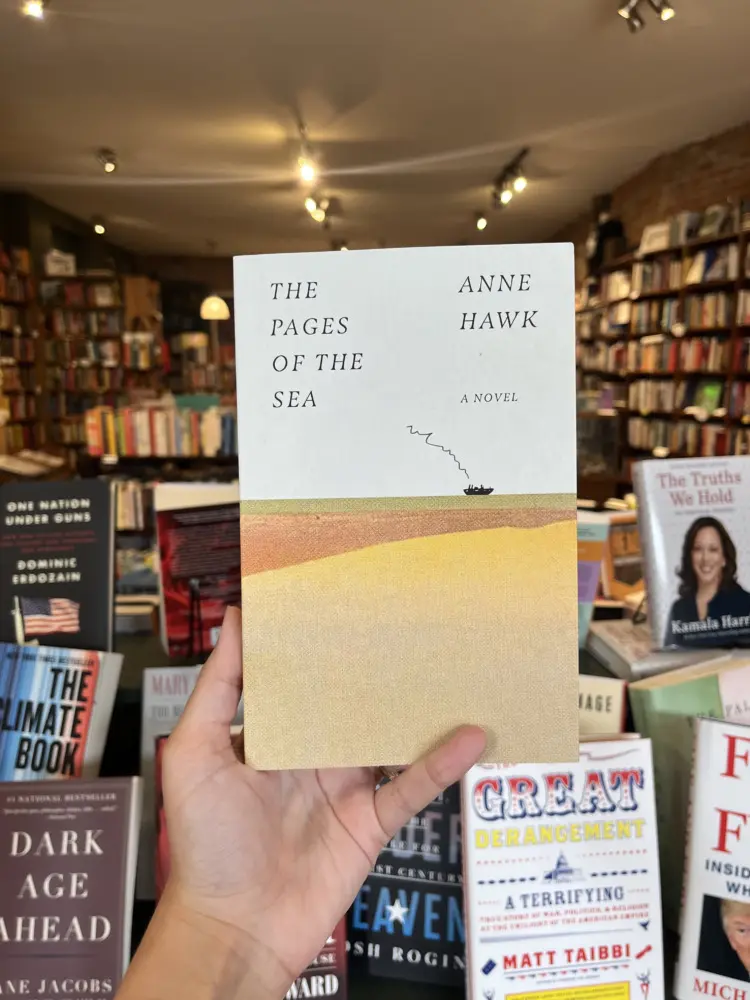The Bibliophile: Anne Hawk on Caribbean English
Want to get new excerpts, musings, and more from The Bibliophile right away? Sign up for our weekly newsletter here!
***
Attention Vancouver readers! The brilliant booksellers at Upstart & Crow will host the Canadian launch of The Pages of the Sea next Thursday, October 3, 2024, at 7:00 PM!
***
Next week marks the US publication date of The Pages of the Sea, Anne Hawk’s debut novel. Featuring Wheeler, an unforgettable young protagonist coping with her mother’s absence while also navigating the mysteries and misadventures of growing up, it’s equally a single girl’s story and a novel of manners: as Wheeler learns to be apart from her mother, she also learns about the life of her small Caribbean community. Like the work of Jane Austen or Marilynne Robinson, The Pages of the Sea captures a distinct time and a place, richly detailed in its observations of the values and customs of one community at a moment in its history. Hawk’s elegant prose ushers the untravelled reader into its world, and—for the place and the people that inspired it—becomes an act of cultural preservation, not least by virtue of its commitment to the community’s heritage language.
I wrote last week about a few of the many reasons this remarkable debut caught my attention, and this week I’m delighted to give you Anne herself, writing on the historical origin of Caribbean English, her own mother tongue, and how her work and that of other Caribbean writers is one means by which its story is being told.
Vanessa Stauffer,
Managing Editor
***
What Is Caribbean English?
The term ‘Caribbean English’ refers to the diverse English-based dialects spoken in former British colonies in the Caribbean. Though commonly grouped under one heading, each language is different, having originated in isolated colonies from Jamaica to Guyana on the northern tip of South America. They reflect influences as diverse as Irish and Scots—the language of plantation overseers—as well as South Asian languages spoken by indentured workers. In some Caribbean countries, the lingering presence of French bears testament to centuries of conflict between French and British colonisers.
There is nothing ‘broken’ about the varieties of English spoken in the Caribbean, as some might suggest. These are heritage languages with a history behind them; namely, the response by enslaved Africans to the wholesale erasure by the trans-Atlantic slave trade of their languages of origin. Fearing those they had enslaved might plot against them—which they frequently did—plantation owners forced enslaved Africans to speak in English only. African languages were policed and ultimately lost in the brutal everyday of chattel slavery. The need to communicate with estate managers as well as other enslaved people gave rise to the development of various forms of English with grammatical features of West African languages, the languages of origin of most enslaved people. Far from broken, Caribbean English contains intimations of cultural preservation and cultural referencing.
Similar in origin, the various dialects spoken in the Caribbean have evolved independently of each other. Attempts to standardise them have largely been unsuccessful, due perhaps to each nation holding to its own historically adapted form of English.
Utter the Jamaican word ‘duppy’ in the Windward Islands and you’ll be met with a blank stare. Change the word to ‘jumbee’ and you’ll get a knowing look. Both are words for ‘spirit’ or ‘ghost’. From bluggoe to alligator pear, enslaved people named the world around them, at times ascribing names from their own languages to similar-looking vegetables and fruit; with the same plant, not surprisingly, being given different names in different places: taro, cocoyam, eddo.
Caribbean English as spoken in Grenada is my mother tongue. It’s a language I haven’t spoken in decades, having emigrated as a child to the UK and then to Canada. Called out on my British-Canadian pronunciation, my iffy vocab, Grenadian English is a language that I haven’t dared speak in the presence of Grenadians for many years.
Who knows how a seemingly ‘lost’ language returns?
The Pages of the Sea, my debut novel, tells the story of the children left behind by the Windrush Generation—migrants from the Caribbean to the UK in the post-war period. The novel chronicles the friendship of Wheeler and her cousin as they spend their free time knocking about, enjoying a type of autonomy that was once commonplace for young children. While thinking as my main character, the inflections and cadences, the rhythm and sounds of my first language seeped into my mouth, like water from a disused well. In service to my young protagonist, I started thinking fluently in Caribbean English, and was subsequently able to give voice to the book’s other characters as well.
The novel is a collaboration between Caribbean and standardised English: between Wheeler—who thinks and speaks in the rich cadences of Caribbean English (Wha it is y’say?)—and a Standard English narrator. From Ingrid Persaud (Love After Love) to Kei Miller (Augustown), Caribbean writers have invented their own ways of reproducing this versatile, bejewelled language on the page. I took the decision to alter the appearance of certain words, for instance ‘hav’ and ‘giv’, in capturing the spoken language of The Pages of the Sea. This is a visual reminder that the book’s narrator and characters inhabit separate language worlds, despite their attributes in common.
Separate and inherently unequal, Caribbean and British English have existed alongside each other for centuries. Educated people once eschewed their mother tongue in favour of Standard English, in case they were thought to be illiterate. Those days are thankfully gone. The history of this diverse and inventive language is now being appreciated and acknowledged. While standardised English is still preferred in formal settings and written work, the spoken language of choice for most people has become their own legacy language, to the extent that many people in the region now support the teaching of Caribbean English in schools.
© Anne Hawk, September 2024
***
In good publicity news:
- May Our Joy Endure by Kev Lambert (trans. Donald Winkler) was reviewed in The Walrus: “Exquisite.”
- The Notebook by Roland Allen was reviewed in the Wall Street Journal: “Bold and thrilling . . . informative and uplifting.”
- A Way to Be Happy by Caroline Adderson was reviewed in The New Indian Express: “Immensely refreshing.”
- Comrade Papa by GauZ’ (trans. Frank Wynne) was reviewed in Publishers Weekly: “[A] fresh and witty portrait of colonial and postcolonial Africa.”
- Crosses in the Sky by Mark Bourrie was reviewed in Canada’s History: “An interesting and accessible retelling.”
- The Globe and Mail’s Fall Fiction Preview included The Pages of the Sea by Anne Hawk, A Case of Matricide by Graeme Macrae Burnet, A Way to Be Happy by Caroline Adderson, and May Our Joy Endure by Kev Lambert (trans. Donald Winkler).
- Seth’s Christmas Ghost Stories were featured in Guelph Today, which included an interview with Seth on the series’ 10th anniversary.




